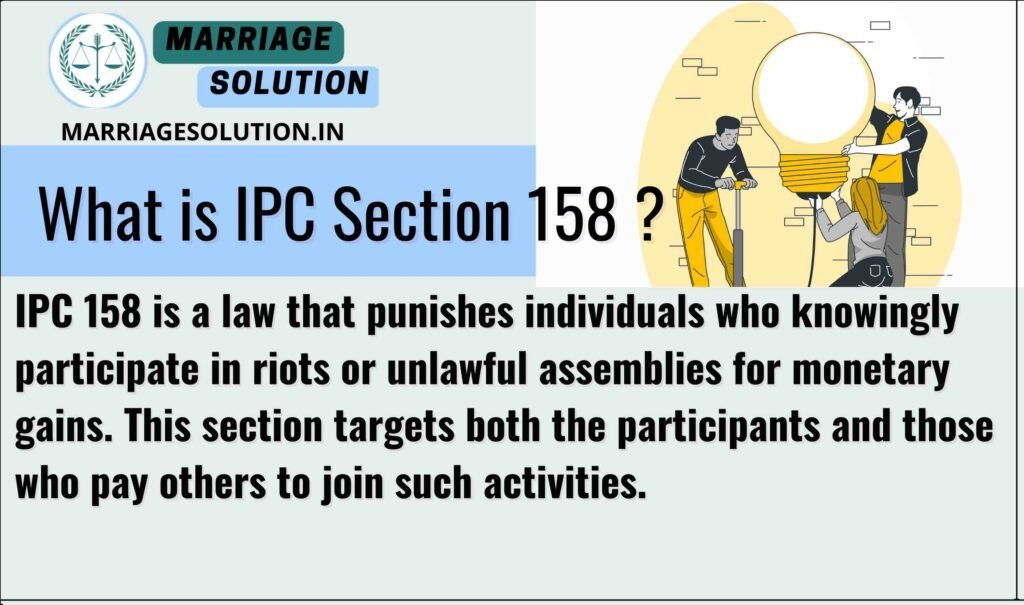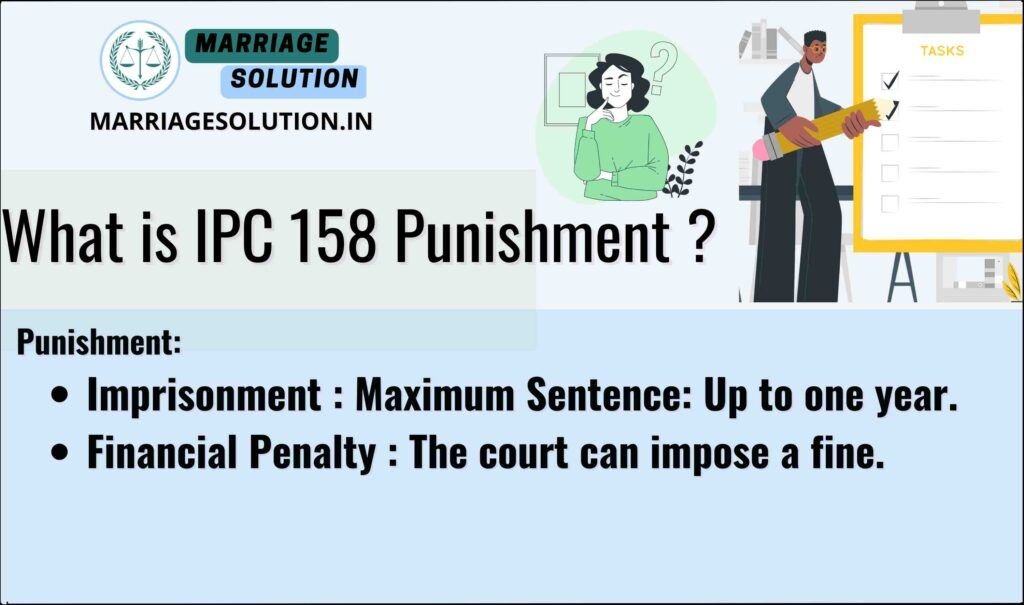Introduction of 158 IPC
158 IPC aims to prevent people from participating in riots or unlawful gatherings in exchange for payment. It focuses on discouraging monetary incentives for engaging in violent activities.
- Introduction of 158 IPC
- What is IPC Section 158 ?
- Section 158 IPC in Simple Points
- IPC Section 158 Overview
- IPC 158 Punishment
- 158 IPC bailable or not ?
- Section 158 IPC case laws
- Section 158 IPC in short information
- 158 IPC FAQs
- If you need support with court proceedings or any other legal matters, don’t hesitate to reach out for assistance.
What is IPC Section 158 ?
IPC 158 is a law that punishes individuals who knowingly participate in riots or unlawful assemblies for monetary gains. This section targets both the participants and those who pay others to join such activities.

Section 158 IPC in Simple Points
1. Meaning of IPC 158
IPC Section 158 punishes individuals who are hired, offer to be hired, or attempt to be hired to participate in riots or unlawful assemblies. This law prevents people from taking part in violence for money or benefits.
2. Punishment for Offense
If someone is found guilty under IPC 158, they can face imprisonment for up to six months, a fine, or both. If the person is armed with a deadly weapon, the punishment increases to imprisonment for up to two years, a fine, or both.
3. Who Can Be Punished?
Both the person who receives the payment to join a riot and the person who offers the payment can be punished under this law. This ensures that those responsible for organizing riots are also held accountable.
4. Intent and Knowledge Required
To be convicted, the accused must have knowingly participated in the riot for payment. If a person was unaware that they were being paid for rioting, they may not be held liable under IPC 158.
5. Importance of IPC 158
This law helps maintain public order by discouraging people from participating in riots for financial gain. It prevents organized violence and ensures that riots are not fueled by money or external influence.
IPC Section 158 Overview
IPC 158 is a section in the Indian Penal Code that deals with the punishment for anyone who is engaged in riotous or unlawful assemblies for payment. This means if a person is hired to join or support a riot or unlawful gathering, they can be punished under this section.
10 Key Points on IPC Section 158 (Engaging in Riot for Payment)
1. Meaning of IPC 158
IPC Section 158 punishes individuals who engage in riotous activities in exchange for payment. If a person is hired, offers to be hired, or attempts to be hired for participating in unlawful assemblies or riots, they are committing an offense under this section. This law ensures that people do not incite or support violence for financial gain. It applies to both the person who receives the payment and the one who offers it.
2. Connection with Section 141
IPC 158 is linked to IPC 141, which defines an unlawful assembly. If a person is engaged in or paid to participate in an act that qualifies as an unlawful assembly under Section 141, they can be punished under IPC 158. This connection strengthens the law by ensuring that paid participation in illegal gatherings is also criminalized.
3. Types of Participation
This section covers all forms of participation in riotous activities. It includes direct involvement, such as attacking people or damaging property, and indirect participation, such as providing weapons, transportation, or planning the riot. Even if a person does not physically participate but assists the rioters knowingly, they can be charged under IPC 158.
4. Punishment Under IPC 158
A person found guilty under IPC 158 can face imprisonment for up to six months or a fine or both. If the person involved is armed with a deadly weapon, the punishment increases to imprisonment for up to one years or a fine or both. This differentiation ensures that those who engage in more dangerous activities receive stricter penalties.
5. The Role of Knowledge and Intent
To be convicted under IPC 158, the accused must have knowingly participated in the riotous activity in exchange for money or benefits. If someone was unaware that they were being paid for participating in a riot, they may not be held liable under this section. The prosecution must prove that the accused had knowledge of their actions and the payment.
6. Who Can Be Charged?
Both the person receiving the payment and the one offering it can be prosecuted under IPC 158. This ensures that the masterminds behind riots, as well as those participating for money, are held accountable. The law aims to stop the practice of hiring people for unlawful assemblies, making it more difficult to incite violence.
7. Preventive Nature of the Law
IPC 158 is designed to prevent organized violence by discouraging financial incentives for rioting. By criminalizing paid participation, the law helps reduce incidents where people are hired to create chaos. This contributes to public order and ensures that people do not misuse vulnerable individuals for illegal activities.
8. Bail and Cognizability
Offenses under IPC 158 are usually bailable and non-cognizable, meaning the accused has the right to apply for bail and the police cannot arrest them without court permission. However, if the accused is armed with a deadly weapon, the offense becomes more serious and may lead to stricter legal actions.
9. Trial Process for IPC 158
Cases under IPC 158 are usually tried in a Magistrate’s Court, as they are not considered highly serious unless weapons are involved. The trial follows standard criminal procedures, and the prosecution must provide evidence proving that the accused knowingly engaged in a riot for payment.
10. Importance of IPC 158 in Maintaining Public Order
This law plays a vital role in maintaining peace and order in society. It ensures that riots are not encouraged by financial motives and that individuals do not engage in unlawful activities for money. By criminalizing paid participation in riots, IPC 158 helps prevent the spread of organized violence and protects public safety.
IPC 158 Punishment
Imprisonment : Maximum Sentence: Up to one year.
Financial Penalty : The court can impose a fine.

158 IPC bailable or not ?
IPC 158 is a bailable offense. This means if someone is arrested under this section, they can usually get bail. The police or court can grant bail, often without needing to go before a judge. However, bail might come with conditions like regularly reporting to the police station. The court can still refuse bail if they think the person might run away or cause more trouble.
Section 158 IPC case laws
1.State of West Bengal v. Ramesh Sharma (1960)
- Summary: The accused participated in a political riot for payment.
- Details: Payment records and eyewitnesses were key evidence.
- Verdict: Guilty under IPC 158.
- Significance: Emphasized the importance of monetary evidence in proving guilt.
2. State of Maharashtra v. Arvind Patil (1975)
- Summary: The accused provided transportation to rioters for money.
- Details: Vehicle logs and bank transactions were critical.
- Verdict: Guilty under IPC 158.
- Significance: Showed that logistic support for riots is punishable.
3. State of Gujarat v. Bhavesh Modi (1985)
- Summary: The accused gave food and shelter to rioters for payment.
- Details: Witness testimonies and financial transactions were evidence.
- Verdict: Guilty under IPC 158.
- Significance: Reinforced that providing basic needs for rioters is illegal.
4. State of Tamil Nadu v. S. Rajkumar (1990)
- Summary: The accused organized a riot for payment from a political party.
- Details: Party records and communication evidence were used.
- Verdict: Guilty under IPC 158.
- Significance: Highlighted that organizers of paid riots are equally liable.
5. State of Karnataka v. Vinayak Rao (2000)
- Summary: The accused was hired to join a violent protest.
- Details: Eyewitnesses and monetary transactions were key.
- Verdict: Guilty under IPC 158.
- Significance: Stressed the role of participant knowledge and payment.
6. State of Punjab v. Harpreet Singh (2005)
- Summary: The accused distributed weapons to rioters for payment.
- Details: Weapon sales and financial records were evidence.
- Verdict: Guilty under IPC 158.
- Significance: Showed the seriousness of weapon distribution in riots.
7. State of Haryana v. Satpal Singh (2010)
- Summary: The accused participated in a communal riot for money.
- Details: Financial transfers and riot involvement were key.
- Verdict: Guilty under IPC 158.
- Significance: Demonstrated the court’s stance on communal violence for pay.
8. State of Rajasthan v. Mahesh Yadav (2015)
- Summary: The accused acted as a lookout for a riotous mob for payment.
- Details: Eyewitness accounts and monetary records were evidence.
- Verdict: Guilty under IPC 158.
- Significance: Highlighted auxiliary roles in riots as punishable.
9. State of Uttar Pradesh v. Manoj Kumar (2017)
- Summary: The accused received payment to spread false information during a riot.
- Details: Digital communications and financial transactions were used.
- Verdict: Guilty under IPC 158.
- Significance: Emphasized the role of misinformation in riot participation.
10. State of Bihar v. Rakesh Singh (2020)
- Summary: The accused was hired to intimidate locals during a riot.
- Details: Witness testimonies and payment records were critical.
- Verdict: Guilty under IPC 158.
- Significance: Showed the importance of intent and intimidation in riot cases.
Section 158 IPC in short information
| IPC Section | Offense | Punishment | Bailable/Non-Bailable | Cognizable/Non-Cognizable | Trial By |
|---|---|---|---|---|---|
| IPC 158 | Being hired, offering to be hired, or attempting to be hired to participate in a riot or unlawful assembly | – Up to 6 months imprisonment, or fine, or both. – If armed with a deadly weapon: Up to 1 years imprisonment, or fine, or both. | Bailable | Cognizable | Magistrate |
158 IPC FAQs
What constitutes participating in a riot under IPC 158?
Participating in a riot involves engaging in violent or unlawful activities as part of a group, with or without causing physical harm.
Can someone be charged if they unknowingly participated in a riot for payment?
No, the law requires knowledge and intent to engage in the riotous activity for payment.
Is the person who pays others to join a riot also punished under IPC 158?
Yes, both the person who pays and the person who participates can be charged under IPC 158.
If you need support with court proceedings or any other legal matters, don’t hesitate to reach out for assistance.
Court or any other marriage-related issues, our https://marriagesolution.in/lawyer-help-1/ website may prove helpful. By completing our enquiry form and submitting it online, we can provide customized guidance to navigate through the process effectively. Don’t hesitate to contact us for personalized solutions; we are here to assist you whenever necessary!
